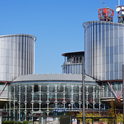Discuss this article atFirst Drafts,Prospect's blog
The brave and photogenic protests in Burma have left much of the international community fretting over its inability to rein in a bruising military regime. Yet the conclusion being drawn by many western politicians and media pundits is that Burma needs more of the very policies that have failed to make a noticeable dint in its stony-faced junta's front for almost two decades.
Sanctions and attempts to cold shoulder the generals do not work because Burma's neighbours see no reason to join in. Aside from its lush resources and strategic location, the quiet truth is that many governments in the region feel little sympathy for street protestors—even ones dressed in rust-red robes.
We have been told several times in recent weeks that China, the regime's chief armourer and business partner, might be tempted to swap the allegedly barmy generals for a nice, stable democratic regime. But this is largely wishful thinking—and Burma has not had a change of government since the late General Ne Win seized power in 1962 (his replacement by another military regime in 1988 hardly counts).
Burma often appears to be a multiple choice test with no correct answers. The junta is simply too paranoid to let mere technocrats run the economy—and its surprise hiking of petrol and compressed gas prices (and thus bus fares) on 15th August, which provoked the street protests, smacks of its usual incompetence. This level of cack-handed management undermines arguments for lifting the west's economic embargo. Yet, as constituted, sanctions are not working because the generals—happy enough in their protected enclaves—do not miss what they have never had. They can survive by selling off natural resources to neighbours like China who, no hypocrisy here, put a priority on energy over democracy. The international community needs to be more focused and more flexible. Smarter sanctions and a better opposition might be a start.
Today, Burma stumbles on because it is not, as the government's statistics purport to show, as poor as Chad. The military feathers its nest, favoured families quietly make money and others get by on bribery, personal connections and a forbearance born of low expectations. Will the State Peace and Development Council, as the junta styles itself (the name was suggested by an American public relations firm) eventually tire of the duplicity and cede power, as the ossified communist authorities did in Czechoslovakia in 1989? It seems unlikely. Like the Czech communists, the junta promotes the dully loyal and punishes intelligence and initiative. But the Velvet Revolution did not face generals who cleave to the amoral political traditions of the old Burmese warrior kings. Despite colonial rule between 1886 and 1948, British notions of impersonal justice and creative opposition never took hold in a people who loathed being anyone's colony. And a brief period of democracy between 1948 and 1962 was chaotic and cynical enough to convince the self-important army it could do better.
In 1988, Aung San Suu Kyi, an Oxford housewife, dropped back into this unpromising world to care for her ailing mother, the widow of an independence hero. It was a year when the population's rage against impoverishing despotism boiled over into unprecedented mass protests. Ne Win shuffled off (as most Burmese generals eventually do) into the dustbin of history, to be superseded by a junta that defused discontent by promising national elections in 1990. But when the National League for Democracy—a party that had quickly formed around Suu Kyi—won most seats, the generals ignored the result.
The much-expanded military is now stronger, at least in terms of brute force, than it was when it wobbled two decades ago. It may be careless about raising bus fares, but it is efficient at dealing with dissent. The universities have been dispersed so that students cannot concentrate in the major cities. Singapore has taught it how to tap telephones and engage in cyber-warfare. The army has also acquired non-lethal crowd control equipment such as tear gas, batons and rubber bullets.
Than Shwe and his colleagues are regularly painted as being of ox-like stupidity by hostile foreigners. But they have thus far been able to outmanoeuvre the opposition and the international community with ease and, although Aung San Suu Kyi is an icon of hope and resistance whose charisma frightens the generals, she has been played like a Burmese harp by them. Suu Kyi has been "free" for six of the last 18 years. Whenever the regime is under pressure, it locks her up: when it feels confident, it loosens the bars. The SDPC this week needed a gesture to appease its friends, so it let the latest UN envoy, Ibrahim Gambari, meet her briefly, and even fluttered the possibility of her meeting Than Shwe.
Suu Kyi remains a unique force for unity in a country bitterly divided between a xenophobic majority and deeply suspicious minorities. In Burmese terms she is a rock star and a saint. Yet her NLD is politically immobile and "the uncles" who run it are increasingly geriatric.
Concerned nations, meanwhile, have made various attempts (not all publicised) to draw the regime out, including nine years ago the offer of a development bribe of over $1bn. The nadir of the United Nations engagement came between 2000 and 2005 when Razali Ismail was its special envoy. Many hoped this former diplomat from Malaysia, a country friendly with the regime, would make the breakthrough. He was bizarrely sloppy: declining to make formal statements at critical times and expressing, almost until his resignation, an airy optimism. He was the first outsider to see Suu Kyi after she narrowly escaped being murdered when the regime's thugs attacked her convoy in May 2003. "She is well and in good spirits," he said. Suu Kyi, it transpired, was being held in a dirty prison cell in same clothes she had on when ambushed a week earlier.
The opposition in exile is well funded by the National Endowment for Democracy and the Soros Foundation and others, but makes no internal impact. Much time is wasted competing for aid money and attending hollow conferences on "capacity building" and "gender and development." Suu Kyi once told me visible cracks will appear in the regime only when it is on the point of disintegration. The international community might encourage this process by insisting on more value for the money it gives exiles who currently—as with pre-invasion Iraq—make much noise but do little of substance.
Power is traditionally problematic in Burma. If you are seen to seek it too vigorously, people suspect your motives. If you make detailed plans you are thought of as Machiavellian. But, if Suu Kyi and the NLD choose not to produce plans that might give hope to potential dissidents inside the regime, there is no reason why others cannot do so. China is a hard nut to crack, but Singapore, the regime's weekend retreat, clinic and banker, could be the focus of greater international pressure. The European Union's recall of military attachés from Burma in 1991 might also be quietly reversed. That brainless gesture removed the diplomats most likely to make informal contacts within the military.
It is hard not to be gloomy about Burma, yet it is not—as some correspondents suggest—an Orwellian society. Some 400 newspapers and magazines are published in the country. Life is difficult, but it is still evolving. There has even been some political movement: the patient, persistent members of the so-called '88 generation of students who did not flee overseas were, before the monk protests, starting, carefully, to assert themselves. This amorphous group has no formal leader, making it harder to combat. First among its equals, however, is Min Ko Naing, a former zoology student who has already spent 16 years in solitary confinement. As recent petition and prayer campaigns for the release of political prisoners gained good support and quietly widened the space for politics, he was rearrested in August.
If no one can stop Asian energy companies moving into Burma, it seems silly to exclude responsible humanitarian agencies that might fuel the makings of a civil society. The monks' protests themselves were magnificent, but doomed to be ruthlessly and efficiently dismantled. They appeared to take the external opposition movement by surprise, despite indications they were at least partly planned. The opposition and international plans for Burma boil down to waiting for the generals to surrender. Perhaps this is the time for serious people to ask if putting up good blogs is a substitute for a coherent political strategy?
Discuss this article atFirst Drafts,Prospect's blog
Bookmark this page with: |











